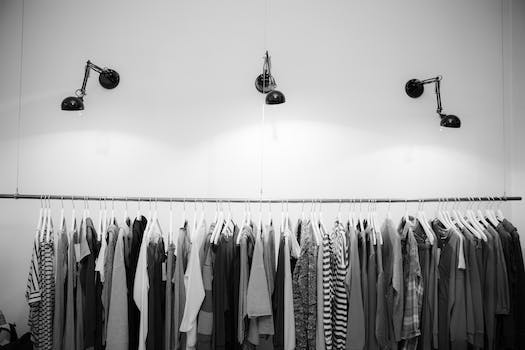Business Opportunities For Clothing
“Unleash your fashion potential with endless business opportunities in the clothing industry.”
Introduction
Business opportunities for clothing are abundant in today’s market. With the rise of e-commerce and social media, it has become easier than ever to start a clothing business and reach a global audience. From designing and manufacturing your own clothing line to reselling popular brands, there are many avenues to explore in the fashion industry. Additionally, the growing demand for sustainable and ethical fashion presents a unique opportunity for entrepreneurs to create environmentally conscious clothing businesses. Overall, the clothing industry offers a diverse range of opportunities for those interested in starting a business.
Top 10 Clothing Franchise Opportunities
Are you looking for a business opportunity in the clothing industry? Look no further! Here are the top 10 clothing franchise opportunities that you should consider.
1. The Children’s Place: This franchise offers trendy and affordable clothing for children. With over 1,000 stores worldwide, The Children’s Place is a well-established brand that continues to grow.
2. Plato’s Closet: This franchise buys and sells gently used clothing and accessories for teens and young adults. With a focus on sustainability and affordability, Plato’s Closet is a great option for those looking to make a positive impact on the environment.
3. Clothes Mentor: Similar to Plato’s Closet, Clothes Mentor buys and sells gently used clothing and accessories for women. With a focus on high-end brands, Clothes Mentor is a great option for those looking to invest in luxury fashion.
4. Uptown Cheapskate: This franchise offers trendy and affordable clothing for teens and young adults. With a focus on sustainability and affordability, Uptown Cheapskate is a great option for those looking to make a positive impact on the environment.
5. Apricot Lane: This franchise offers trendy and affordable clothing for women. With a focus on unique and stylish pieces, Apricot Lane is a great option for those looking to stand out from the crowd.
6. Lululemon: This franchise offers high-quality athletic wear for men and women. With a focus on sustainability and ethical production, Lululemon is a great option for those looking to invest in quality activewear.
7. Athleta: Similar to Lululemon, Athleta offers high-quality athletic wear for women. With a focus on sustainability and ethical production, Athleta is a great option for those looking to invest in quality activewear.
8. Levi’s: This franchise offers high-quality denim and casual wear for men and women. With a focus on sustainability and ethical production, Levi’s is a great option for those looking to invest in quality denim.
9. J.Crew: This franchise offers high-quality clothing and accessories for men, women, and children. With a focus on classic and timeless pieces, J.Crew is a great option for those looking to invest in quality fashion.
10. Forever 21: This franchise offers trendy and affordable clothing and accessories for men and women. With a focus on fast fashion, Forever 21 is a great option for those looking to stay on top of the latest trends.
No matter which franchise you choose, there are a few things to keep in mind when starting a clothing business. First, it’s important to have a clear understanding of your target market and what they’re looking for in terms of style, quality, and price. Second, it’s important to have a solid business plan in place, including a marketing strategy, financial projections, and a plan for growth. Finally, it’s important to stay up-to-date on the latest trends and developments in the fashion industry, and to be willing to adapt and evolve as needed.
In conclusion, the clothing industry offers a wide range of business opportunities for entrepreneurs looking to invest in a profitable and rewarding venture. Whether you’re interested in sustainable fashion, luxury brands, or fast fashion, there’s a franchise out there that’s right for you. So why wait? Start exploring your options today and take the first step towards building a successful clothing business.
How to Start a Successful Online Clothing Store

Starting an online clothing store can be a lucrative business opportunity for those with a passion for fashion and an entrepreneurial spirit. With the rise of e-commerce, more and more consumers are turning to online shopping for their clothing needs. In this article, we will discuss the steps you need to take to start a successful online clothing store.
1. Identify your niche
The first step in starting an online clothing store is to identify your niche. What type of clothing do you want to sell? Will you focus on a specific demographic, such as women’s clothing or children’s clothing? Will you specialize in a particular style, such as vintage or bohemian? By identifying your niche, you can tailor your product offerings and marketing efforts to appeal to your target audience.
2. Develop a business plan
Once you have identified your niche, it’s time to develop a business plan. This should include your mission statement, target market, marketing strategy, financial projections, and more. A well-developed business plan will help you stay focused and on track as you launch and grow your online clothing store.
3. Choose a platform
There are many e-commerce platforms available for online clothing stores, including Shopify, WooCommerce, and BigCommerce. Each platform has its own set of features and pricing options, so it’s important to do your research and choose the one that best fits your needs and budget.
4. Source your products
Next, you’ll need to source your products. You can either create your own clothing line or source products from wholesalers or manufacturers. When sourcing products, it’s important to consider factors such as quality, price, and shipping times.
5. Build your website
Once you have your products, it’s time to build your website. Your website should be visually appealing, easy to navigate, and optimized for search engines. You’ll also need to set up payment processing and shipping options.
6. Market your store
With your website up and running, it’s time to start marketing your store. This can include social media marketing, email marketing, influencer partnerships, and more. The key is to reach your target audience and build brand awareness.
7. Provide excellent customer service
Finally, it’s important to provide excellent customer service. This includes responding to customer inquiries in a timely manner, offering easy returns and exchanges, and providing a seamless shopping experience. By providing excellent customer service, you can build a loyal customer base and grow your online clothing store.
In conclusion, starting an online clothing store can be a rewarding and profitable business opportunity. By following these steps, you can launch and grow a successful online clothing store that appeals to your target audience and provides excellent customer service. With hard work and dedication, your online clothing store can become a thriving business that you can be proud of.
The Benefits of Owning a Custom Clothing Business
Are you looking for a new business opportunity? Have you considered starting a custom clothing business? There are many benefits to owning a business in the clothing industry, and custom clothing is a niche that is growing in popularity.
One of the biggest benefits of owning a custom clothing business is the ability to offer unique and personalized products to your customers. With custom clothing, you can create one-of-a-kind pieces that are tailored to your customers’ specific needs and preferences. This can be a huge selling point for customers who are looking for something that is truly unique and special.
Another benefit of owning a custom clothing business is the ability to work with a wide range of customers. Whether you are creating clothing for individuals, businesses, or organizations, there is a huge market for custom clothing. This means that you can cater to a variety of different customers and create products that are tailored to their specific needs.
In addition to the creative and personal aspects of owning a custom clothing business, there are also many financial benefits. Custom clothing can be a high-margin business, meaning that you can make a significant profit on each item that you sell. Additionally, because you are creating unique and personalized products, you can charge a premium price for your services.
Of course, like any business, there are also challenges that come with owning a custom clothing business. One of the biggest challenges is managing the production process. Because each item is unique, it can be difficult to manage the production process and ensure that each item is of high quality. However, with the right systems and processes in place, this challenge can be overcome.
Another challenge is marketing and promoting your business. Because custom clothing is a niche market, it can be difficult to reach potential customers and build a strong customer base. However, with the right marketing strategies and a strong online presence, you can build a loyal customer base and grow your business over time.
Overall, owning a custom clothing business can be a rewarding and profitable venture. With the ability to create unique and personalized products, work with a wide range of customers, and make a significant profit, it is a business opportunity that is worth considering. If you are passionate about fashion and design, and are willing to put in the hard work and dedication required to succeed, then a custom clothing business may be the perfect opportunity for you.
Trends in Sustainable Fashion and How to Capitalize on Them
Sustainable fashion is a growing trend that has been gaining popularity in recent years. Consumers are becoming more conscious of the impact their clothing choices have on the environment and are seeking out sustainable options. This shift in consumer behavior has created a new market for businesses to capitalize on.
One way to take advantage of this trend is by offering sustainable clothing options. This can include using eco-friendly materials such as organic cotton, bamboo, or recycled fabrics. It can also involve implementing sustainable production practices such as reducing waste and using renewable energy sources.
Another way to capitalize on the sustainable fashion trend is by offering clothing rental services. This allows consumers to rent clothing for a specific event or period of time, reducing the need for them to purchase new clothing. This not only benefits the environment but also provides a cost-effective option for consumers.
In addition to sustainable clothing options, businesses can also focus on ethical and fair trade practices. This involves ensuring that workers involved in the production of clothing are treated fairly and paid a living wage. By promoting ethical and fair trade practices, businesses can appeal to consumers who value social responsibility.
One example of a business that has successfully capitalized on the sustainable fashion trend is Patagonia. The outdoor clothing company has been a leader in sustainable and ethical practices for years. They use recycled materials in their clothing and have implemented fair trade practices in their production process. Patagonia has also launched a clothing repair program, encouraging consumers to repair their clothing rather than purchasing new items.
Another example is Rent the Runway, a clothing rental service that has gained popularity in recent years. The company offers a wide range of clothing options for rent, including sustainable and eco-friendly options. Rent the Runway also promotes the idea of renting clothing as a way to reduce waste and promote sustainability.
In addition to these examples, there are many other opportunities for businesses to capitalize on the sustainable fashion trend. This can include offering clothing recycling programs, implementing sustainable packaging practices, and promoting the use of eco-friendly cleaning products.
Overall, the sustainable fashion trend provides a unique opportunity for businesses to appeal to consumers who value social responsibility and environmental sustainability. By offering sustainable clothing options, implementing ethical and fair trade practices, and promoting sustainable production and consumption practices, businesses can position themselves as leaders in the sustainable fashion movement.
The Pros and Cons of Starting a Clothing Rental Service
Starting a clothing rental service can be a lucrative business opportunity for those who are passionate about fashion and entrepreneurship. However, like any business venture, there are pros and cons to consider before diving in.
One of the biggest advantages of starting a clothing rental service is the potential for high profit margins. By renting out clothing items instead of selling them, you can generate a steady stream of income without having to constantly restock inventory. Additionally, renting out clothing allows you to charge premium prices for high-end designer pieces that may be out of reach for many consumers to purchase outright.
Another benefit of starting a clothing rental service is the opportunity to tap into the growing trend of sustainable fashion. As more consumers become aware of the environmental impact of fast fashion, they are seeking out alternative options for their wardrobe needs. By offering a rental service, you can provide a more eco-friendly option for fashion-conscious consumers.
However, there are also some potential drawbacks to starting a clothing rental service. One of the biggest challenges is managing inventory and ensuring that items are kept in good condition. Unlike traditional retail, where customers purchase items and take them home, rental items are constantly being circulated and need to be maintained to a high standard. This can require significant time and resources, particularly if you are dealing with delicate or high-end pieces.
Another potential challenge is the need to constantly update your inventory to keep up with changing fashion trends. Unlike traditional retail, where items can be sold off at a discount if they don’t sell, rental items need to be constantly refreshed to keep customers interested. This can require a significant investment in new inventory, which may not always pay off if certain items don’t prove popular with customers.
Despite these challenges, starting a clothing rental service can be a rewarding and profitable business opportunity for those who are willing to put in the work. To succeed in this industry, it’s important to have a strong understanding of fashion trends and consumer preferences, as well as a solid business plan that takes into account the unique challenges of the rental model.
One key strategy for success is to focus on a specific niche within the rental market. For example, you may choose to specialize in high-end designer pieces, or focus on sustainable and eco-friendly fashion. By honing in on a specific niche, you can differentiate yourself from competitors and build a loyal customer base.
Another important factor to consider is your marketing strategy. In order to attract customers to your rental service, you’ll need to invest in effective marketing and advertising campaigns. This may include social media marketing, influencer partnerships, and targeted advertising to reach your ideal customer demographic.
Ultimately, starting a clothing rental service can be a challenging but rewarding business opportunity for those with a passion for fashion and entrepreneurship. By carefully considering the pros and cons of this model, and developing a solid business plan and marketing strategy, you can build a successful and profitable rental service that meets the needs of fashion-conscious consumers.
Conclusion
Conclusion: The clothing industry offers a wide range of business opportunities, from designing and manufacturing to retail and e-commerce. With the rise of sustainable and ethical fashion, there is also a growing demand for eco-friendly and socially responsible clothing brands. As the global population continues to grow, the demand for clothing is expected to increase, making it a promising industry for entrepreneurs and investors. However, competition is fierce, and success requires creativity, innovation, and a deep understanding of consumer preferences and trends.




